You can label me whatever you’d like, but the fact of the matter is I was right! The minute I softened, let my guard down, that’s when Salem had her opening.
-7×13 “The Enemy of Trust”
It’s rare that a scene that cements why I love a character so much features said character shooting a child at point blank range and sending him falling to his apparent death. Yet despite his heartless and cruel actions throughout the story, his carefully constructed fall to darkness has ensured James Ironwood’s place as my favourite character in RWBY.
In my previous piece, I discussed the construction of Ironwood’s arc through the series, and contrasted him to another hero who fell to the dark side; Daenerys Targaryen. While both of their journeys to villainy had strong foundations, the build-up to Ironwood’s turn was much stronger than Daenerys’. Ironwood’s flaws – his paranoia, his stubbornness – were organically built upon, and I was fully anticipating he’d become an antagonist.
As for Daenerys…there was none of that. Her actions were presented as Empowering and Heroic. It’s only in season seven when all of a sudden people – namely Saint Tyrion – start having an issue with the way she goes about things. Unlike Ironwood, whose flaws naturally transitioned into villainous traits over time, the audience was suddenly supposed to be concerned with what Daenerys had been doing for the last six seasons. So, it’s okay when she slaughters brown people, but it’s problematic when they’re white?
Sigh.
Look, it’s been nearly four years since season eight came out. I don’t think there’s anything I can say about Daenerys that hasn’t already been said. Her actions in “The Bells” were a giant slap in the face to her characterization and everything that she’d accomplished over the last seven seasons. The writers tried to cram in an entire hero to villain arc in one season, and did an astonishingly sloppy job at it. What upset me the most about Daenerys’ characterization was something that we’re all too familiar with here at the Fandomentals: honeypotting.

For those of you who haven’t checked out Julie and Kylie’s entertaining glossary of book snob terminology, honeypotting is when the sheer lack of storytelling logic forces fans to theorize explanations so that the story actually makes sense; you know, what the writers are supposed to be doing in the first place. This far and away my biggest problem with Daenerys in season eight; to create any sort of narrative cohesion, I have to do the writer’s jobs for them. I walked away from Season 8 feeling like the onus was on me to explain Daenerys’ actions. I felt like I was the one who had to piece together the dumpster fire that was her ‘character arc’ and come up with a believable reason for why she decided to burn down King’s Landing. If you put your audience in that position, you have failed to create a functioning narrative.
Even after reading through a list of possible motivations on Game of Thrones Wiki, nothing has been able to convince me. The show simply didn’t put in the time and effort to make Daenerys’ arc believable. It felt like the showrunners wanted us to think Daenerys was evil, but with the abysmal effort they put in to convince the audience, it was more like they were trying to shove ‘Mad Queen Daenerys’ down our throats. Or, as WinterIsComing.net put it; “We were asked to believe that Daenerys was mad because they were telling us she was, but the audience knew better.”
Now, let’s be clear; I’m all for subtext. I don’t think a series has to clearly spell out every single thing for its audience. Providing just enough information to lead viewers in the right direction but letting them come to a conclusion on their own is an admittedly tricky line to walk, but when it’s executed properly it can make for some truly great storytelling.
This is something GoT actually did really well in its early seasons. The Small Council scene in 3×03, “Walk of Punishment,” has no dialogue for almost two minutes, yet ‘says’ so much through body language and facial expressions alone. Littlefinger’s hunger for power, Varys’ distaste for said hunger, Cersei’s absolute refusal to be locked out of politics because of her gender, Tyrion’s defiant attitude towards his father, Tywin’s exasperation at Tyrion’s antics…I could go on. All of this is conveyed to the audience, without a single word spoken.
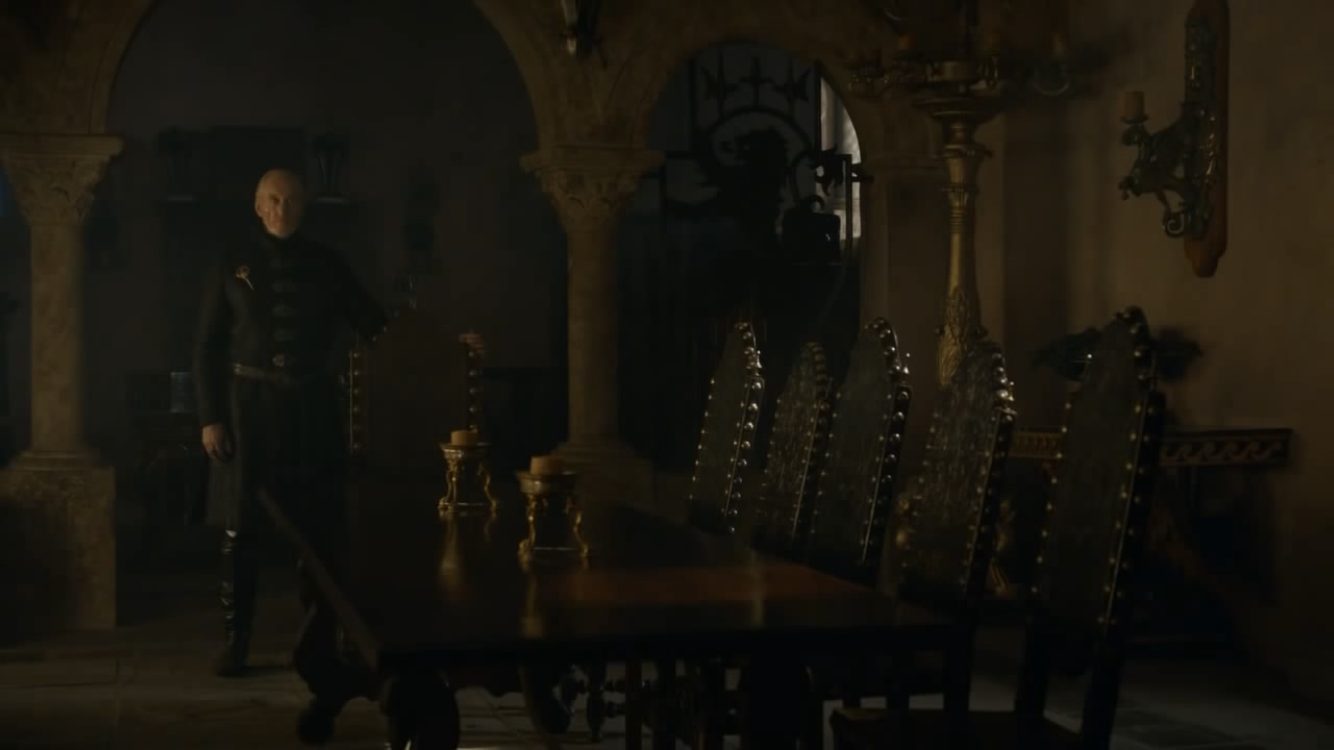
The reason why this scene works so well is because it draws on already established information about the characters. By this point, the series has had over two seasons to flesh these characters out. The audience knows enough about them that they don’t need to be spoon fed the answers; they can work it out themselves and draw a logical conclusion.
Season eight isn’t a matter of subtext though. The writers simply failed to make me believe that Daenerys would do what she did. Though there were hints of her turning darker, the leap from burning a few soldiers to burning a city of innocents was simply too great. At this point, I’m stunned every time someone finds Daenerys’ arc believable. Ironwood, on the other hand…well, I’m stunned every time someone doesn’t find his arc believable.
As I’ve mentioned previously, Ironwood’s transformation was very well set up over the course of the story. Volumes two and three had established his character and his flaws, while four through six built up those flaws and seeded the idea that he was paranoid and volatile. The Dust embargo, the withdrawal of Atlas’ military, the closing of Atlas’ borders; the series was building towards him becoming an antagonist well before it actually happened. Volume Six ended on the perfect note to set up this transformation – a shot of Atlas, with its fleet out in full force. For the better part of a year, this was the image of Atlas, and by extension Ironwood, that the fandom was left to ponder. Even before volume seven started, the show had laid so much groundwork that I for one was already prepared to accept Ironwood as a villain.
So, going into the first chapter/episode of volume seven I wasn’t at all surprised by the depiction of Ironwood. The massive, towering images of him projected throughout Mantle as he attempts to reassure the citizens of the city, the increased military presence, the comments about how tired he looks – right from the get-go, the stage was set for him to become a villain. What did surprise me was what happened next.
After volume five, I lost a lot of faith in RWBY. Volume six definitely earned a lot of it back, but I still didn’t have particularly high hopes going into volume seven. I fully expected the protagonists to spend volume seven tiptoeing around an ultra-paranoid Ironwood, with the volume’s climax featuring him snapping and turning into a fully-fledged villain. So, I was pleasantly surprised that when Ruby and co. reunited with Ironwood, he wasn’t drowning in paranoia, but calm and collected. He took the time to explain his actions. Not only that, but the audience learned that he’d shared information with his allies, and was already working on a plan to try and unite the world to fight Salem.
I know how this all looks. Recalling my military? The embargo? I probably don’t seem the most trustworthy right now.
-RWBY 7×02 “A New Approach”

If nothing else, this is what makes Ironwood’s arc work so well; he tries. Over and over and over again, Ironwood really does try and do what he thinks is best for Atlas. And while his interpretation of what is best for everyone may drastically differ from Ruby and co., the continual attempts to do the right thing makes his transformation not feel inevitable. Yes, I did strongly suspect Ironwood was going to become a villain and wasn’t surprised when he did, but the show spent enough time focusing on his heroic aspects that when he and Robin team up to help Mantle, I genuinely though there was a chance Ironwood would stay a hero. It didn’t last, but the fact remains that RWBY was able to keep me on my toes.
This becomes more obvious when comparing RWBY to GoT. Throughout seasons seven and eight, Daenerys becoming the Mad Queen feels inevitable. Her ruthlessness in incinerating Randyll and Dickon, her impatience to attack King’s Landing after the Battle of Winterfell, her apathy towards whether the people there live or die…there’s no real effort by Daenerys to change her ways, just Saint Tyrion’s desperate attempts to reason with her. There’s one particular line by her in 8×04 “The Last of the Starks”:
Speaking to Cersei will not prevent a slaughter. But perhaps it’s good the people see that Daenerys Stormborn made every effort to avoid bloodshed, and Cersei Lannister refused.
I don’t know whether to laugh, roll my eyes, or facepalm at how lazy and unearned this is. Frankly, it’s a slap in the face to the audience’s intelligence. Daenerys puts in the absolute minimum amount of effort into doing the right thing. There’s no negotiating or compromising on her behalf; at the most, she just holds herself back because of what Tyrion, Varys or Jon say. They make the effort, not her. I mentioned previously that I incorrectly predicted Ruby and co. would spend all of volume seven tiptoeing around Ironwood; that’s what Daenerys in season eight feels like. Her becoming the Mad Queen is a foregone conclusion, and all Saint Tyrion can do is delay it.

With Ironwood, this conclusion doesn’t feel set in stone. When Jaune criticizes him for how his actions have affected Mantle, Ironwood admits he’s right and believes Ruby and co. can do some good for the city, before giving them their Huntress and Huntsman licenses. When Ruby and co. point out that working with Robyn will help him with the situation in Mantle, he acknowledges it could work, and later does team up with her. And even though he’s skeptical about Oscar’s suggestion of sitting down and talking to the people who don’t trust him, that’s what he eventually does. There is still a clear downward spiral of Ironwood trusting people less and less throughout these incidents, but his attempts to listen and modify his behaviour makes his eventual transformation that much more understandable. The audience has seen how hard Ironwood has tried to do the right thing, so that when he does snap, they understand it’s because he’s hit his limit.
No, no. You’re right. Things in Mantle have been…hard to manage lately. I’m not blind to its issues. In fact, that’s what I want to talk to you about. With the launch of this mobile communications tower and tensions down in Mantle, I think there’s a lot of good your teams can do here.
-RWBY 7×04 “Pomp and Circumstance”
What ties this all together is the pacing. I’ll admit that volume seven’s episodic approach did leave some things to be desired; putting most of the action scenes in the last few episodes in a series known for its fights didn’t do the volume any favours, and it can feel quite slow at times. However, it worked incredibly well for Ironwood’s spiral to darkness. Spacing it over the course of the volume made the transformation much more gradual, and it never feels like his changes in personality are unbelievable. Each passing episode he’s just a little more ruthless, a little more willing to do whatever it takes to get the job done.
As shown in the prior quotes, Ironwood is willing to work with Ruby and co. in the first few episodes of V7. However, as the volume goes on and the pressure continues to mount, his bullheadedness begins to show. He starts pushing people away, and adopting an ‘ends justify the means’ approach, even considering declaring martial law. That being said, the series still take the time to explain his point of view;
We can’t! If we talk about Amity now, we risk Salem’s forces, who we know are here, working to sabotage it. If we tell them about Salem now, we risk falling to the Grimm before we can reunite Remnant. We have to finish the tower.
-RWBY 7×07 “Worst Case Scenario”
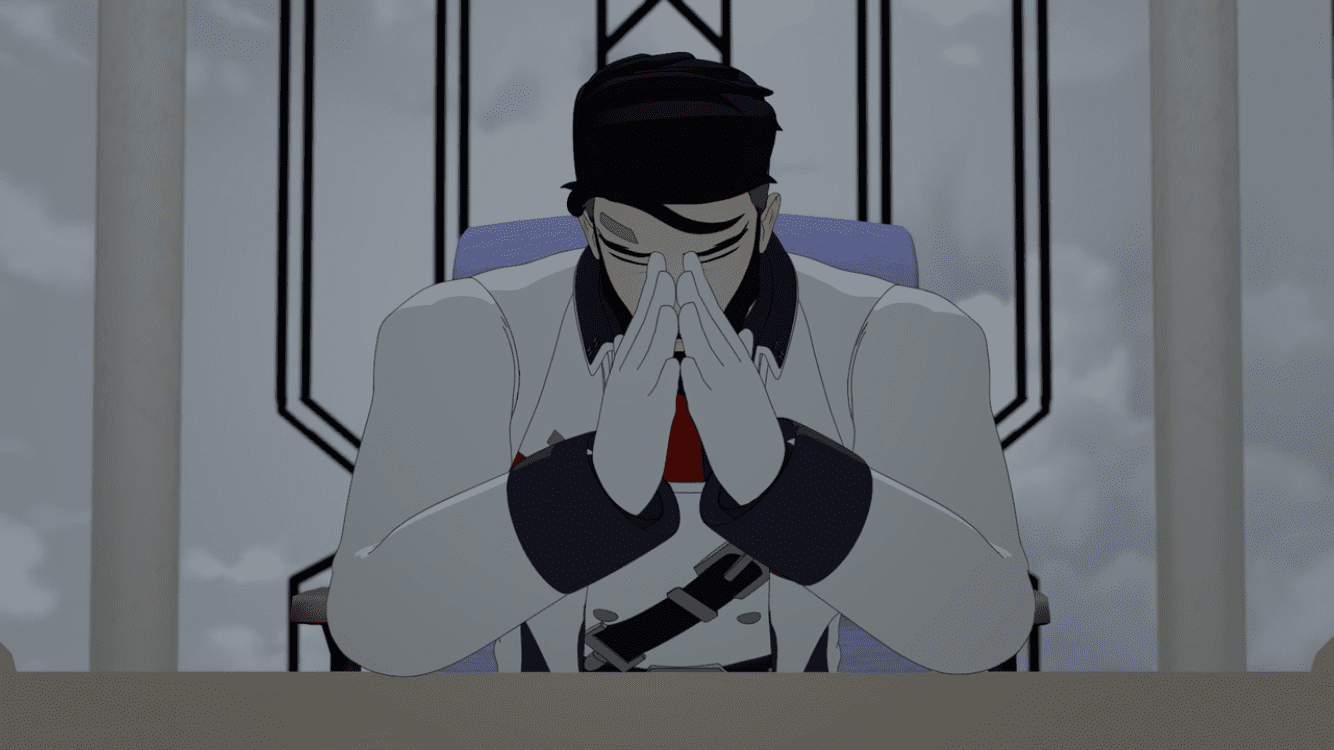
Declaring martial law may be an extreme action, but Ironwood has a point. As disastrous as his secrecy and shows of force are for his public image, he has very understandable reasons for them. That’s what makes his transformation so much more compelling than Daenerys; while Ironwood and Daenerys both do terrible things in the name of the greater good, the former’s reasoning is explored in depth. As for the latter…I really can’t think of any time Daenerys ever gave even a halfway decent reason for her actions in season eight. It’s incredibly rushed, as if it were a homework assignment written the night before. Yes, there are reasons that can explain Daenerys’ mental state – the death of Jorah, Missandei and Rhaegal, Varys’ betrayal, Jon and Tyrion’s ‘betrayal’…but it’s all thrown at the audience so fast it doesn’t have time to sink in.
This is another reason why Ironwood’s arc works – it not only gives the audience reasons for his actions, but time to absorb them. It’s not a bombardment of possible motivations crammed into a few episodes, but a downwards spiral that feels natural, and subsequently much more engaging. The series even manages to misdirect the audience just before the climax of the volume, when Ironwood does do the right thing and tries to bring Mantle and Atlas together;
But we cannot let ourselves give in to fear and panic. That is what she wants! Instead, we must unite, and fight back, together. Every single one of us!
-RWBY 7×10 “Out in the Open”
Which makes it all the more powerful when Ironwood finally does snap. The heroic moments, the dramatic swelling of music, all of it signals a chance that the tide can truly be turned on Salem…until one man brings it all crashing down – literally. While it’s a very sudden shift in tone, the groundwork laid throughout the volume, and ostensibly the entire series, makes it work. Ruby lying to him, Blake and Yang going behind his back, the knowledge of Salem’s incoming assault; the pressure and his own flaws come to a head, and he finally snaps. No rushed motivations, no cognitive dissonance – just the perfect climax of his arc.
When I watched Daenerys torch King’s Landing, I sat there in disbelief. When Ironwood’s paranoia finally bubbled over and he turned against Ruby and co., I was excited for what was to come next.
Well, that was before you lied to me about the lamp. Before you lied to us about Robyn, before Salem was right on our doorstep. Before Mantle was nearly destroyed, and myself and my army were left exhausted!
-RWBY 7×11 “Gravity”
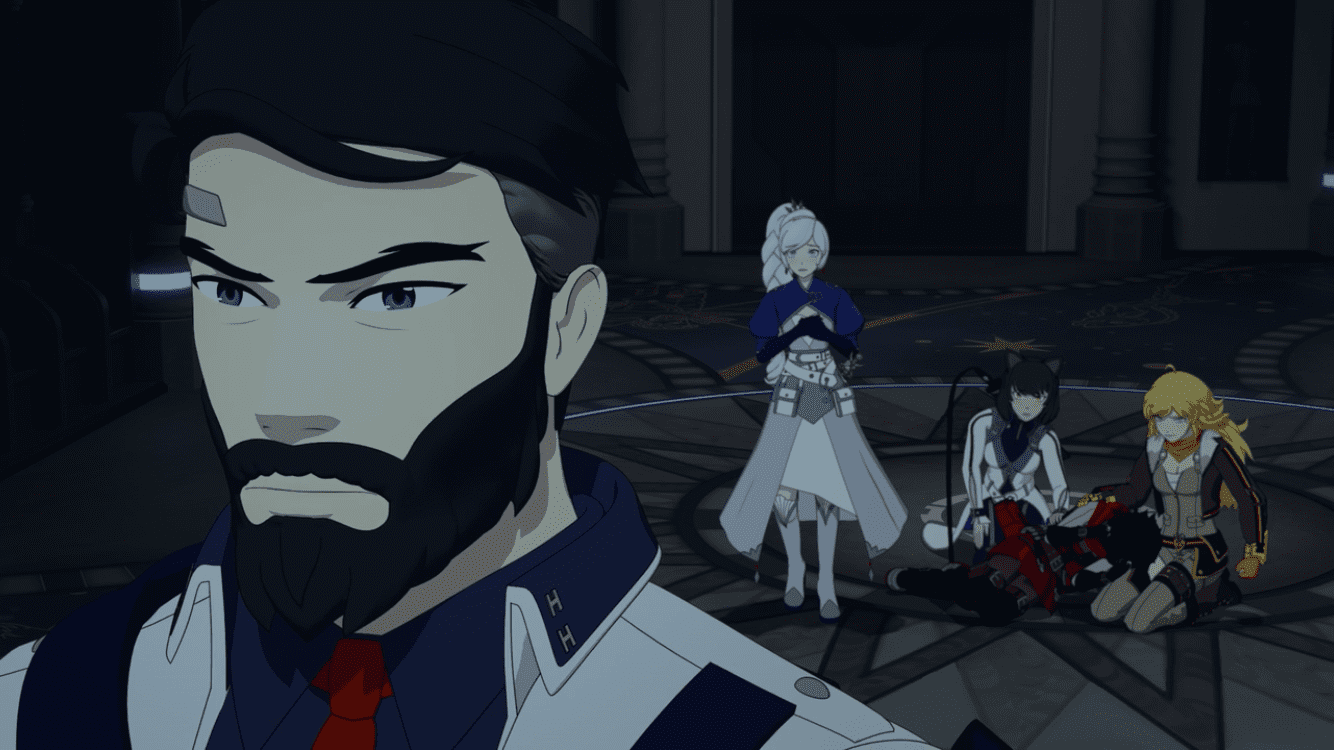
Now, there is one tiny flaw to Ironwood’s story. It’s not with the way his character development plays out though, but with how a key piece of information about Ironwood wasn’t conveyed very clearly to the audience. In a twist of irony, this is also exactly where Daenerys’ ‘arc’ crumbles; mental health as a justification for destroying a city.
Something that is never explicitly discussed in the series is Ironwood’s Semblance, Mettle. According to series writer Eddy Rivas, Mettle strengthens Ironwood’s resolve, allowing him to push down his hesitation and complete the task he’s set his mind to. Now, this does perfectly fit with everything that’s been established about Ironwood, and I am sympathetic to the writers not wanting to waste valuable screentime on exposition, especially given my past issues with the show needing to take a lesson in ‘show, not tell’. The only real indication of when he’s using it is that his voice becomes flatter, and his eyes become duller. However, this has never been confirmed.
In the grand scheme of things, it’s a minor gripe overall, and that’s largely due to the fact that the writers spent the time establishing the enormous amount of pressure Ironwood was under. Throughout the volume, there are so many signs of how exhausted he is; slumped shoulders, lines under his eyes, and frequent, fatigued sighs establish that this is a man at his limit. These small moments make it much, much easier to accept his breakdown. Frankly, with everything that happens in volume seven, I still found his transformation believable even without factoring in a supernatural mental health condition.
With Daenerys, it’s the exact opposite. The writing of her character arc is so poorly done that I felt that Targaryen madness was just a weak, last-minute attempt to explain her actions. It was too little, too late though. Her actions in The Bells were ‘explained’ by a sloppy patchwork of illogical reasoning and a rushed arc. Conversely, when Ironwood made the decision to destroy a city (or at least threaten to), his actions completely fit with his harsh logic of doing the right no matter the cost that had been organically built up over the course of the series. Threatening to bomb Mantle to get Penny back was, to be clear, a heinous maneuver, but like the rest of his actions as a villain, I understood why he did it.
That’s what makes Ironwood such a great villain; what he does is wrong and inhumane, but his reasoning has been laid out such that I never questioned why he was doing things. From beginning to end, the series gave him the time to explain his actions, even up to his final showdown with Winter. Shooting Councilman Sleet? To eliminate opposition to him declaring martial law. Abandoning Mantle? To prevent an immortal, unstoppable opponent from getting her hands on the Winter Maiden and the Relics. Threatening to bomb Mantle? Leverage to get Penny and the power of the Winter Maiden back so he could use the Relic to keep Atlas out of Salem’s reach. In his own twisted way, he was the hero, saving the day by doing what no one else is willing. That’s what his character has always been about, from the moment he stepped on-screen.
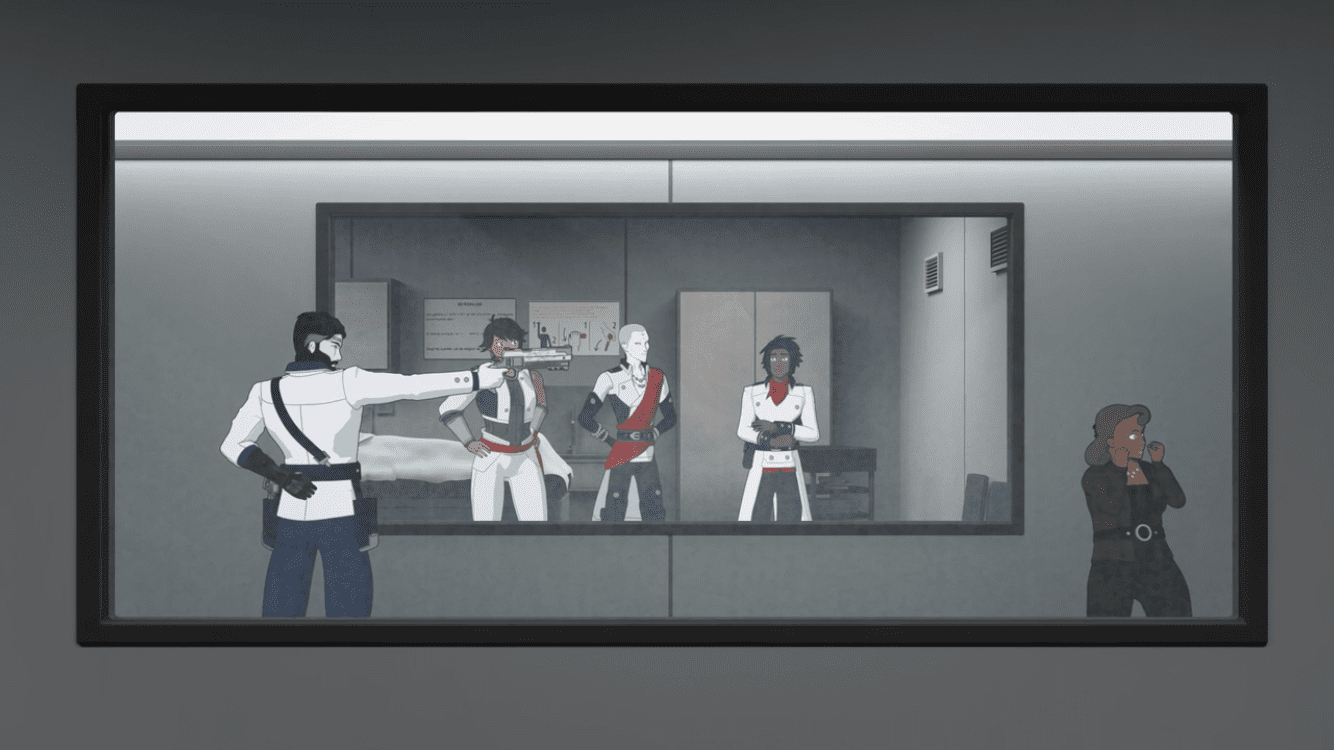
Ironwood’s theme song is titled, rather aptly, Hero. It’s the perfect reflection of how he views himself, with every lyric painting the picture of a man who will do whatever it takes to stop Salem, regardless of the consequences. A man who doesn’t care if he’s seen as a tyrant, (For you no matter how I am despised), who will sacrifice anything (There’s no sacrifice, that I won’t make) – whatever it takes to get the job done. To add a cherry on top, it debuts in arguably one of the greatest fight scenes of the series, Ironwood vs Watts. Not just because it features incredibly creative use of the surrounding geography, but because the fighting styles of the opponents match their characters. Watts, the analytical tech genius, uses the technology of the biomes within Amity Colosseum to his advantage, while bull-headed military man Ironwood uses a combination of brute force and tactics to stop his opponent, not hesitating to sacrifice his human arm in the process.
It’s this attention to detail that shows just how much care and thought has gone into every moment that Ironwood is on screen. Every action he takes, every line of dialogue, every sigh and slump of his shoulders – helped in no small part by an absolutely stellar performance from his voice actor, Jason Rose – it all organically builds towards a natural crescendo, rewarding the audiences with a payoff years in the making. With Daenerys…there’s nothing but a rushed character arc that feels like a slap in the face for everyone who had followed her story for years. When she stared out over King’s Landing, it wasn’t the culmination of her story, but of everything wrong with GoT. But when Ironwood and Oscar had their confrontation in the Atlas Vault, I was ready to accept him as a villain. When he pulled that trigger, it was the final chapter in the book of a hero, and the first chapter of a tyrant.
And that is why Ironwood is Daenerys done right.
IRONWOOD: No, you listen! I am done letting other’s inability to see the big picture get in the way of doing what’s right. Robyn, the council, this kingdom, even you.
OSCAR: Then you’re as dangerous as she is, James.
IRONWOOD: James is what my friends call me. To you, it’s General.
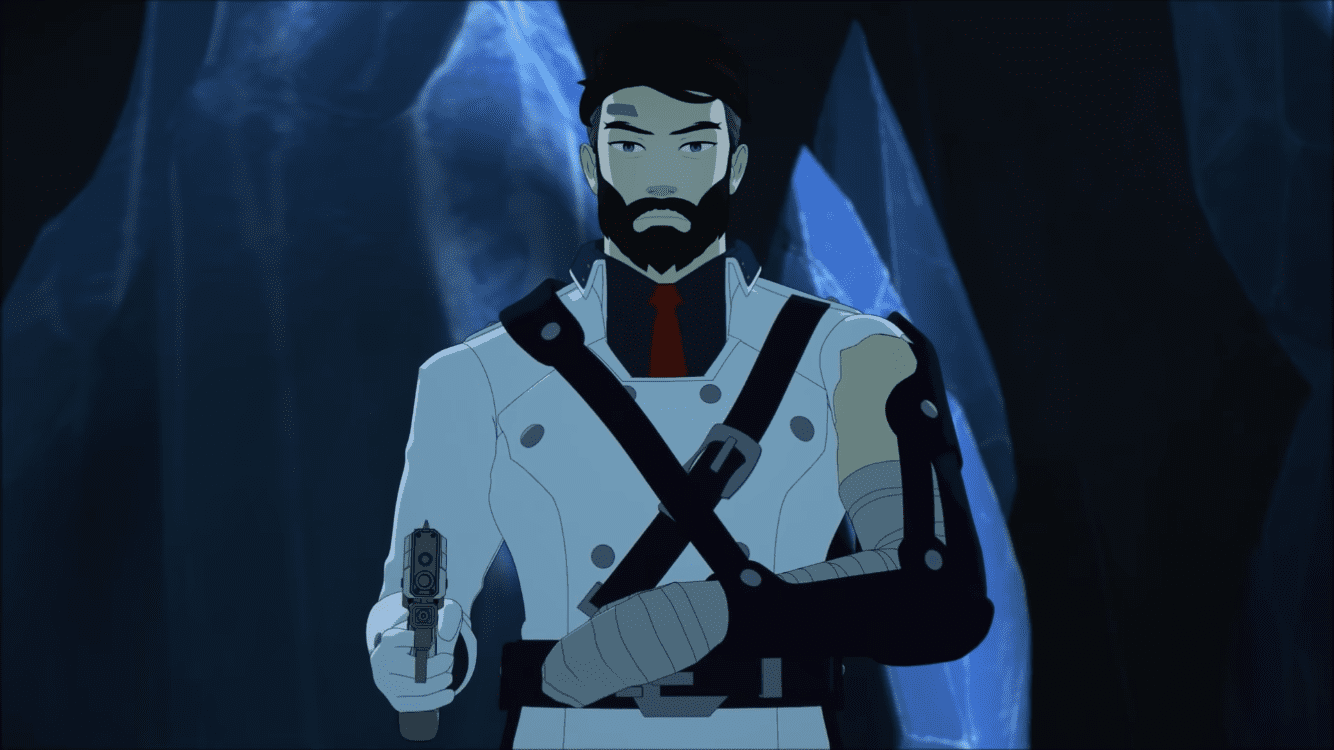
Images courtesy of Rooster Teeth Productions and HBO
Have strong thoughts about this piece you need to share? Or maybe there’s something else on your mind you’re wanting to talk about with fellow Fandomentals? Head on over to our Community server to join in the conversation!

